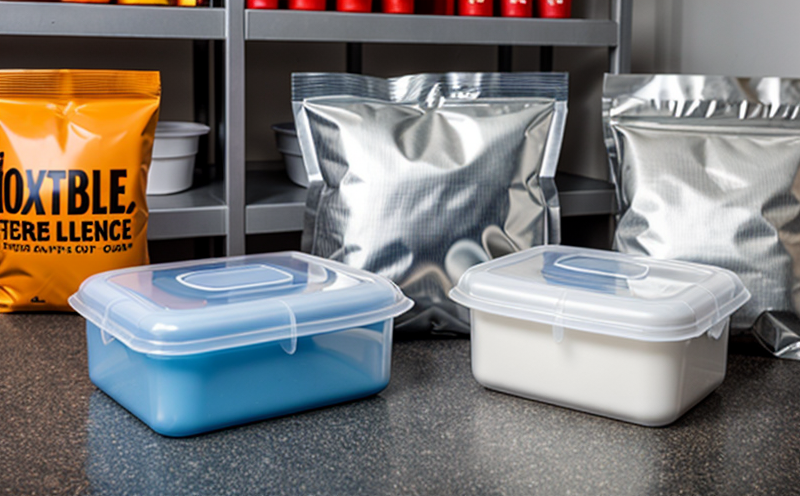ISO 6383-3 Tear Resistance of Laminated Films
The ISO 6383-3 standard is a critical component in ensuring the quality and reliability of flexible packaging materials, particularly laminated films. This test evaluates the tear resistance of these materials by subjecting them to controlled tearing forces. Understanding this property is vital for industries that rely on robust packaging solutions, such as food and pharmaceuticals.
The standard specifies a method using a pendulum-like device known as the tear tester. This apparatus measures the energy required to initiate and propagate a tear along the grain direction of the film. The test involves clamping one end of the specimen between two jaws while allowing the other end to hang freely. A pendulum strikes the free end, causing it to tear. The force at which this occurs is measured in joules (J).
The significance of this test lies in its ability to predict how a packaging material will behave under real-world conditions. For instance, a weak tear resistance could lead to premature failure during shipping or handling, resulting in product contamination or loss. Conversely, materials with high tear resistance can ensure the integrity and safety of packaged goods.
Compliance with ISO 6383-3 is not only about meeting regulatory requirements but also about enhancing brand reputation and consumer trust. Consumers expect products to be safely contained within their packaging, and a strong tear resistance ensures this expectation is met. Additionally, the test helps in optimizing material selection by providing insights into the performance characteristics of different films.
The procedure outlined in ISO 6383-3 is straightforward yet precise. Specimens are typically cut from larger rolls to ensure representativeness. The specimens should be free from defects and have a uniform thickness across their width. Prior to testing, they must be conditioned according to the specified environmental conditions (temperature and humidity) to simulate real-world exposure.
The test setup includes a pendulum that is calibrated to deliver a specific impulse energy. This energy is chosen based on the expected tear resistance of the material. The specimen is then clamped into place, and the pendulum is released. The force at which tearing occurs is recorded as the critical value for the test.
Results from this test can be used to compare different materials or batches within a production run. By establishing baseline values, companies can track changes in material quality over time, ensuring consistency in product performance. Moreover, these results can inform decisions regarding process improvements and supplier selection.
In summary, ISO 6383-3 is an essential tool for ensuring the robustness of flexible packaging materials. It provides a standardized method to assess tear resistance, which is crucial for maintaining the integrity of packaged products during transport and storage. By adhering to this standard, manufacturers can enhance their products' quality and reliability, thereby building customer confidence.
Benefits
- Ensures compliance with international standards for flexible packaging materials.
- Aids in optimizing material selection by providing insights into performance characteristics.
- Helps in identifying defects or inconsistencies within a production batch.
- Supports process improvements and supplier evaluation.
- Maintains consistent product quality across different batches and production runs.
- Promotes brand reputation by ensuring the integrity of packaged goods.
Eurolab Advantages
Eurolab offers unparalleled expertise in flexible packaging testing, including ISO 6383-3 tear resistance assessments. Our team of highly qualified professionals ensures that every test is conducted with precision and accuracy, adhering strictly to international standards.
- Absolutely state-of-the-art facilities equipped for comprehensive testing.
- Access to the most advanced instrumentation for reliable results.
- Dedicated staff trained in the latest methodologies and best practices.
- Prompt turnaround times, ensuring timely reports and actionable insights.
International Acceptance and Recognition
The ISO 6383-3 standard is widely recognized across the globe for its reliability in assessing tear resistance. Many countries have adopted this standard as a part of their national regulations, ensuring uniformity in testing protocols.
- ISO 6383-3 has been adopted by numerous countries including the United States, Canada, and several European nations.
- It is frequently referenced in quality management systems (QMS) audits as a key performance indicator for flexible packaging materials.





